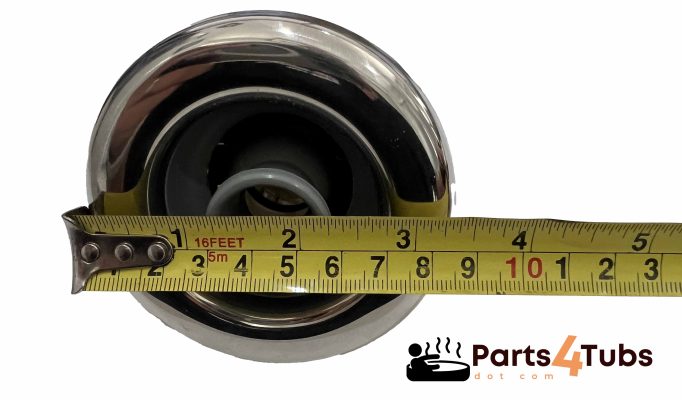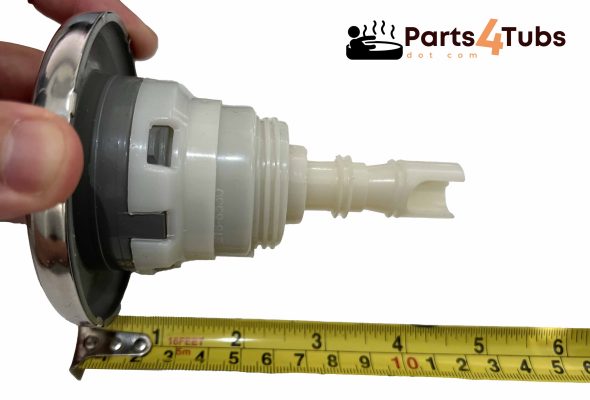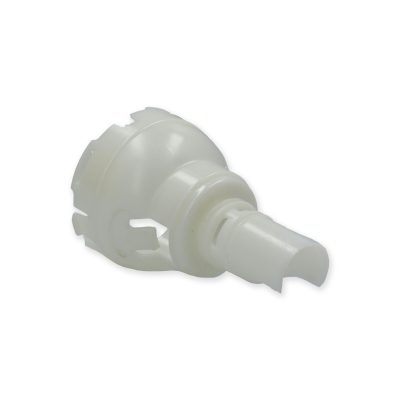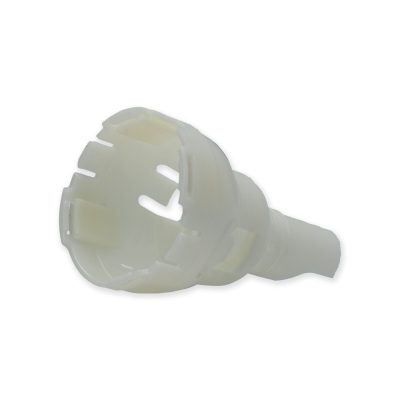Waterway Poly Storm Dual Rotating Jet Assembly 3-3/8" 229-4041S
$27.73
Jet, Poly Storm, Twin Roto, Threaded, 4-Swirl Esc, Black
Out of stock
Want to be notified when this product is back in stock?
Waterway Poly Storm Dual Rotating Jet Assembly 3-3/8" 229-4041S
This Poly Storm Jet is manufactured for Dynasty Spas by Waterway. Designed, Engineered & Manufactured in the U.S.A. Waterway Plastics is proud to design, engineer and produce our quality line of products right here in the USA, using only premium NSF Approved materials & meeting all Certifications and Standards, at our 460,000 sq. ft. facility in Oxnard, CA. Waterway, committed to innovation & excellence since 1973.
Additional Information
| Color | Black |
| Nozzle Type | Dual Rotating |
| Face Diameter | 3-3/8" |
| Face Style | Swirl |
| Spa Brands | Dynasty Spas |
Alternate Part Numbers
- 14265
- 229-4041S
A Jet Explained
Hot tub jets serve the purpose of directing streams of water in various directions, and they are installed within the jet body that is securely fixed into your hot tub. These jets not only serve a functional role but also add an aesthetic touch, sometimes even bearing the mark of your spa brand, such as SUNDANCE® SPAS, Marquis, and DIMENSION ONE SPAS®.
How do Hot Tub Jets Work?
How Hot Tub Jets Operate Hot tub jets are known for their water-pushing prowess, creating a soothing massage experience. But have you ever wondered how they work? The inner workings of hot tub jets are closely tied to the fundamentals of hot tub plumbing.
Here's a breakdown of how hot tub jets function:
-
Suction and Water Flow:
- Water exits the hot tub through a suction line, with the suction force generated by the hot tub pump.
-
Filtration:
- The water proceeds through the pump into a filtration system, where it undergoes a cleaning process to remove debris and contaminants.
-
Heating:
- Filtered water is directed to the heater, where it passes over a heating element and gets warmed up.
-
Return to the Tub:
- After heating, the water re-enters the hot tub through the return line.
-
Jet Action:
- The water flows into the entrance of the hot tub jet, where the magic happens.
-
Venturi Effect:
- Inside the jet, there's an inner pipe that undergoes a unique transformation. It narrows and then widens again, resembling a sideways hourglass.
-
Physics at Play:
- This is where the Venturi effect comes into play. As water flows through the narrow middle portion of the inner pipe, its speed increases, while the pressure within the pipe decreases.
-
Mixing Air and Water:
- At the exit point of the jet, which is visible in the hot tub shell, water and air are simultaneously expelled from the jet into the hot tub.
-
Repeating the Process:
- The entire cycle repeats, ensuring a continuous flow of water and air for your enjoyment.
The pivotal moment in this process is the Venturi effect, where the hourglass-like shape of the inner pipe accelerates the water's speed while creating a pressure differential. As a result, the surrounding air, at higher pressure than the exiting water, is drawn into and mixed with the water stream, generating the beloved bubbly effect that enhances your hot tub experience.
Identifying Hot Tub Jets
Front Face Measurement
To identify a hot tub jet, begin by measuring the diameter of its front face. Take note of the jet's color and the style of massage it offers. The most common jet styles include directional, rotational, twin rotational, and massage jets.
Should you desire a change, you can replace your existing jet with a different massage style as long as the front face diameter and diffuser type match. However, it's crucial not to interchange jets from different manufacturers - in short, it doesn't work and they don't fit!
For direct replacements, be cautious when dealing with directional and rotational jets, as they can appear identical. The key difference lies in the jet nozzle: rotational jets feature a half-moon shape in the nozzle, while directional jets do not.


Diffuser Replacement
The rear part of the jet, known as the diffuser, can be replaced separately. Over time, even the most meticulous hot tub users may experience jet pop-outs due to water chemistry issues. This occurs as the locking clips degrade. The solution is to purchase either new jets or jet diffusers.



While replacing diffusers can save you money, it can be a somewhat intricate task. Each brand and manufacturer has a unique design specific to their jet bodies, and diffusers are not interchangeable between different brands.
If you wish to replace a diffuser once identified, you can find compatible options based on the following codes:
- 218-5140: Waterway Cluster Storm (Up to 2")
- 218-6930: Waterway Mini Storm (2"-4")
- 218-4000: Waterway Poly Storm (2"-4")
- 218-6610: Waterway Power Storm (5"+)
Please note jets that start 212 are click in and 229 are thread in.
Rising Dragon also provides identification numbers for their diffusers:
- RD201-3011/12: Push fit, typically 3-1/3" jets
- RD203-3011/12: Threaded fit, typically 3-1/3" jets
- RD203-5011/12: Threaded fit, typically 5" jets
Color and Texture
Hot tub jets come in various colors, including grey, black, white, and stainless steel, sometimes with textured (mottled) or smooth finishes. Stainless steel-rimmed jets are available with grey, black, or white internal plastic components.
Types of Hot Tub Jet
Different Types of Hot Tub Jets:
-
Rotational Jets:
- In rotational jets, a combination of air and water creates a circular motion in the hot tub water, providing a soothing massage experience.
-
Directional Jets:
- Directional jets have a unique feature where the central section of the jet can be adjusted to direct water flow in a specific direction. Typically, these jets feature a single port in the center.
-
Pulsator Jets:
- Pulsator jets are designed with a central section containing at least two openings. When water pressure is applied, this central section rotates, causing the water to alternate between the openings. Some pulsator jets also incorporate a straight bar along the middle of the face, which spins when water pressure is activated.
-
Multi-Massage Jets:
- Multi-massage jets boast a jet face with numerous smaller holes that divide the water into multiple individual streams. This design offers a diverse and invigorating massage experience.
-
Ozone/Cluster Jets:
- Ozone or cluster jets typically lack a visible nozzle, and they are often non-adjustable. They feature an open central section through which water flows, contributing to overall water circulation in the hot tub.
Each type of hot tub jet offers a distinct massage sensation, allowing you to customize your spa experience to your liking.
Sizes
If you can't find any identifiable markings, part numbers, or logos on the jet face, you can attempt to visually determine the brand based on the following measurements. However, be aware that Waterway and CMP jets may look similar but are not interchangeable:
- Waterway Cluster Storm resembles the CMP Typhoon 200 series.
- Waterway Mini Storm resembles the CMP Typhoon 300 series.
- Waterway Poly Storm resembles the CMP Typhoon 400 series.
- Waterway Power Storm resembles the CMP Typhoon 500 series.
Knowing the age of your spa can also aid in identifying the type of jet. Generally, if you purchased your hot tub before 2010, it likely has Waterway jets, while post-2010 models may have different references on the jet.
If no reference is visible due to wear or friction, an opaque white rear jet diffuser typically corresponds to a Waterway jet, whereas a transparent white rear jet diffuser corresponds to a CMP jet.
Feel free to contact me for more information or assistance in identifying your hot tub jets.
Jet Manufacturers
Here are listings of hot tub jets from various manufacturers:
- Waterway Jets
- Pentair Jets
- Rising Dragon Jets
- CMP Jets
Please note that CMP and Waterway diffusers may appear similar, so exercise caution when examining your jets.
Frequently Asked Questions:
-
Are Hot Tub Jets Universally Compatible?
No, hot tub jets are not universally compatible. Compatibility depends on the specific hot tub model. To ensure the right replacement, measure the front face diameter of the jet and identify its part number.
-
What Is the Lifespan of Hot Tub Jets?
The lifespan of a hot tub jet varies based on factors like jet type, quality, usage frequency, water hardness, and environmental conditions. With proper maintenance, these jets can typically last several years.
-
How Much Does Hot Tub Jet Replacement Cost?
The cost of replacing a hot tub jet can vary, depending on the jet type and the source of purchase. Generally, a single jet may cost between $10 to $50, with potential discounts for bulk orders. Labor costs may apply if the installation process is complex.
-
Does More Jets Equal a Better Hot Tub?
The number of jets in a hot tub is important, but it's not the sole indicator of a great hot tub experience. The number of pumps a hot tub has and the variety of jet types it offers are often more significant factors. Consider these aspects when shopping for a home spa to find the ideal model that suits your specific needs.
| Brand | Waterway |
|---|
Related products
Waterway Jets
Waterway Jets
Waterway Jets
Waterway Jets
Waterway Jets
Waterway Jets


























